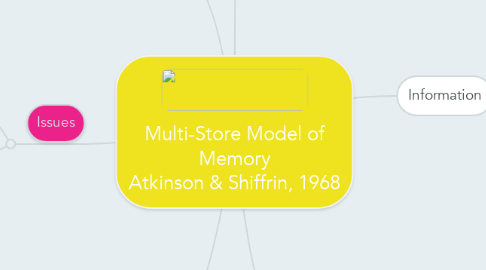Multi-Store Model of Memory Atkinson & Shiffrin, 1968
by Iza Bruce


1. Application
1.1. Chunking increases information available in STM
1.2. Study Skills
1.2.1. Rote Learning
2. Issues
2.1. Application to society
2.1.1. Rote Learning
2.2. Scientific
2.2.1. Components can be studied individually
2.2.1.1. BUT reductionist
3. Research
3.1. Glanzer & Cunitz
3.1.1. Primary & Recency effect
3.2. Clive Wearing
3.2.1. Unable to remember new information
3.2.1.1. problem with STM
3.2.2. Recognises wife/Can play piano
3.2.2.1. indicating LTM
4. Problems
4.1. Reductionist
4.1.1. 'Rehearsal' is too simple for STM>LTM
5. Theories
5.1. Many show development
5.1.1. WMM, episodic & semantic
6. Information
6.1. Sensory Memory
6.1.1. Duration limited
6.1.2. Large capacity
6.1.3. From 5 senses
6.1.4. 5 stores
6.1.4.1. Encoding is modality specific
6.1.5. Must attend to information for it to pass into STM
6.2. STM
6.2.1. 30 sec duration
6.2.2. 5-9 capacity
6.2.3. Acoustic encoding
6.2.4. Information maintain through rehearsal
6.2.4.1. Then transfers to LTM
6.3. LTM
6.3.1. Infinite duration
6.3.2. Infinite capacity
6.3.3. Mainly semantic encoding
